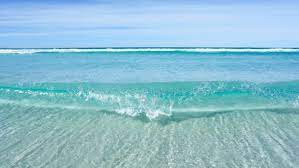Sustenance of life is one of the important and foremost benefits of sea water. Sea water, being a significant part of the earth’s surface, taking up about 70% of the planet’s surface, is a major contributor of life to humanity. It contains minerals and organic substances that sustains life, both on land and in the water, and makes quality of life better.
[ninja_tables id=”67388″]
Despite the vastness of the sea, its water has been and is still useful to humans and animals in many ways, some of which include the provision of minerals such as sodium, calcium, potassium, and halogens such as chlorine and fluorine. In some parts of the world, it is the major source of drinking water during dry periods.
In this article, we will discuss the benefits of sea water, the minerals it contains, and the special skin healing properties these minerals provide to the human skin, individually, and in combination. We will also lightly touch on the nature of the sea water and some other benefits it offers.
The Sea Water.
Sea water, for those who are familiar with the aquatic nature and environment, is the body of water that is considered to be the saltiest in the world, even though the different seas of the world have different levels of saltiness. The saltiness of the sea is as a result of dissolved ions such as sodium and chlorine, which are the constituents of salt.
It also contains other ions and minerals that contribute to its peculiar nature but the levels of these solutes differ from sea to sea, thus making it impossible to put a figure to the general quantity of minerals seas contain. Some of the elements the sea contains include the life supporting oxygen, carbon, hydrogen, magnesium, potassium, sulphur, bromine, and calcium.
Sea water also contain more microbes than research has been able to quantify, making it a host for different forms of organic and inorganic substances. In many cases, these organic substances, especially the microbes such as Cyanobacteria and Thiomargarita namibiensis, help in making oxygen available in the atmosphere and breaks down hydrogen sulphide, respectively.
General Benefits of Sea Water
While water generally has its benefit to our lives here on earth, sea water, specifically has some benefits it shares with water (moreover it is water itself) and other benefits that only it, and some other salty water bodies can give.
Oxygen and Hydrogen supply
Oxygen is life. Without it, there will be life sustenance for humans and other aerobic animals. Many processes in the human body such as respiration depends on oxygen, and an abundance of it means there is sufficient supply of energy as it is used for the process of metabolism.
Humans majorly get oxygen from the atmosphere, that is the air we breathe in, but how does oxygen never get exhausted in the air. One of the rich supplies of oxygen to the atmosphere are trees – they give off oxygen as a by-product of photosynthesis – and the other source is through evaporation – that is the transfer of water molecules from water bodies into the atmosphere. One of the water bodies where these molecules are gotten is the sea.
Water, being a compound that is comprised of two-parts hydrogen and one-part oxygen, on dissociation of the individual elements, oxygen combines with another oxygen to form the oxygen gas, while hydrogen gas, already formed, becomes part of the air we breathe in.
Related reading: 10 Amazing Health Benefits of Onion Juice with Honey
Source of hydration
We need water to hydrate our body. There are times when water is easily come by and times when it is difficult to get water, especially in arid areas. The sea is one of the sources of water for humans and despite the saltiness of the sea water, it can be drunk after treatment.
In dry parts of the earth such as the Middle East, where water is not easy to come by, drinkable water is gotten from the sea by removing the salt minerals from the water to make it drinkable.
Supports bacterial life
It is said that we are yet to know the majority of life that inhabits the waters. Findings in 1957 about the number of microbes in sea water was 10,000 whereas by the 1990s, the number had doubled. Now, there is a prediction that the number of microbes in sea water may rise to the millions.
The beneficial effects of bacteria in human lives is evident in the balance they help to keep in the ecosystem. They mostly live as free swimmers in the sea but some live through symbiosis and provide certain benefits to their hosts. For instance, diatoms form links in the sea. These links help to cycle ocean silicon.
Archaea, a group of bacteria helps to control global warming by breaking down methane – ne of the greenhouse gases – in the ocean floor.
Source of minerals
There’s no telling the amount of minerals the sea holds. From positive ions to negative ions, it is abundant in them. Minerals such as magnesium and bromine are extracted from the sea by the United States of America and China, respectively.
Also, some amount of uranium has been extracted from the sea as well.
Sodium, calcium, Magnesium, and Potassium, are commonly commercially extracted from the sea as it holds an abundance of them.
Health and Dermal (Skin) Benefits of Sea Water
The benefits of the sea water, health-wise has never been in doubt, even though extensive research is yet to be done in support of this. However, in ancient Egypt, and early England, patients with medical conditions of the skin and the mind have been advised to spend time at sea. Some people with asthma have confirmed respiratory ease when they are close to the sea.
Related reading: Is Sea Kelp Good for Your Skin?
Treatment of Psoriasis
The scaly, red, itchy patches on the skin of the scalp, trunk, and elbows, that are commonly seen on people is called Psoriasis. It is a skin disease that seems to fade off at certain times only to return after some time.
One of the causes of this skin condition is a cold, dry environment and an opposite of such environment will help manage the condition effectively.
It has no known cure but there are treatments that help to manage the symptoms. Since the disease is triggered by an anomaly in the immune system, sea water, rich in minerals such as zinc, magnesium, and potassium, that help to strengthen the immune system may be of help in managing the condition.
Improves mood
Being around the sea and water generally improves the mood. So many times, we have heard people say they’re going to the beach, stream, or river to clear their heads. It is not only because of the serenity of the environment, but also because the minerals contained in the water are present in the immediate atmosphere.
Minerals such as zinc and selenium help in the production of serotonin and consequently improves the mood.
Could be used for Cholesterol control
Some study shows that the minerals in deep sea water, that is water that is pumped from the sea at a depth of 200m and deeper contains higher concentration of minerals such as magnesium which help to burn more cholesterol.
This study shows that magnesium significantly reduced the total cholesterol and Low-Density Lipoproteins (LDL) of the test animals and can do the same in humans.
Improves Cardiovascular health and protects from heart problems
If minerals such as magnesium can reduce cholesterol and zinc, which is also one of the minerals found in sea water, helps in muscle contraction regulation, it means sea water can be beneficial in helping to improve cardiovascular health.
It can also help prevent the occurrence of heart issues as it strengthens the arteries and help them function better.
Diabetes treatment
The same research that postulated that sea water could help control cholesterol level also states that it could be used to treat diabetes.
On the tests, deep sea water, was able to increase the level of insulin and glucagon that was secreted. It also helped the islets of Langerhans recover and suppressed hyperglycaemia while improving glucose intolerance.
Conclusion
Sea water refers to water gotten from the sea. It is characteristically rich in minerals, some of which make it salty and undesirable to consume as a source of hydration. However, when it is treated to remove the sodium and chlorine content, it is perfectly okay to drink.
The benefits of the sea water range from the environmental goodness it does to the planet by housing bacteria that helps to breakdown methane, one of the greenhouse gases, to the health benefits it gives to humans, beginning from helping in the supply of oxygen. It also helps in the management of some skin conditions such as psoriasis.
Some areas of potential benefits are yet to be explored. As researches explore these areas the goodness we can get from the sea seem uncountable.





